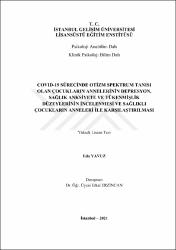| dc.contributor.author | Yavuz, Eda | |
| dc.date.accessioned | 2023-06-12T15:29:06Z | |
| dc.date.available | 2023-06-12T15:29:06Z | |
| dc.date.issued | 2021 | en_US |
| dc.identifier.uri | https://hdl.handle.net/11363/4862 | |
| dc.description | Danışman: DR. ÖĞR. ÜYESİ ERKAL ERZİNCAN
Yer Bilgisi: İstanbul Gelişim Üniversitesi / Lisansüstü Eğitim Enstitüsü / Psikoloji Ana Bilim Dalı / Klinik Psikoloji Bilim Dalı
Konu: Psikoloji = Psychology | en_US |
| dc.description.abstract | Araştırmanın amacı, COVID-19 sürecinde otizmli çocuğu olan annelerin depresyon, sağlık anksiyetesi ve tükenmişlik düzeyleri ile normal gelişim gösteren çocukların ailelerin depresyon, sağlık anksiyetesi ve tükenmişlik düzeylerinin karşılaştırılmasıdır. COVID-19 hastalığı Çin'in Wuhan kentinde Aralık 2019'da ortaya çıkmış, bu hastalık Dünya Sağlık Örgütü (DSÖ) tarafından pandemi olarak bildirilmiştir. Hastalığın teşhisinde genel ve kişiye özel birçok belirtiler saptanmış olup genel olarak tanımlanan semptomları arasında ateş, öksürük, boğaz ağrısı, yorgunluk, tat alma duyusunda değişiklik yer almaktadır. Tüm dünyayı etkisi altına almış bu virüs özel gereksinimli çocukları ve bakım verenlerini de zorlu bir sürece süreklemiştir. Bu çalışma OSB tanısı konan 60 ve normal gelişim gösteren 80 çocuğun anneleri ile gerçekleştirilmiştir. Çalışmada annelerin depresyon düzeylerini ölçmek için Beck Depresyon Ölçeği, sağlık anksiyetesinin düzeyini ölçmek amacıyla Sağlık Anksiyetesi Ölçeği, tükenmişlik düzeylerini ölçmek amacıyla ise Maslach Bakım Veren Tükenmişlik Ölçeği kullanılmıştır. Araştırmamızda bağımlı değişkenler (depresyon, sağlık anksiyetesi ve tükenmişlik) otizm teşhisi almış çocukların anneleri ve normal gelişim gösteren çocukların anneleri ile kıyaslanmıştır. COVID-19 sürecinde OSB'li çocukların annelerinin yaşadıkları depresyon, sağlık anksiyetesi ve tükenmişlik düzeyleri daha yüksek bulunmuş ve sağlıklı çocukların annelerine göre anlamlı farklar saptanılmıştır. Annenin eğitim durumuna göre sağlık anksiyetesi bulgularının eğilimin arttığı sonucuna ulaşılmıştır. Sonuç olarak ikili grupların karşılaştırıldığı bu araştırmada OSB tanısı almış çocukların annelerinde depresyon, tükenmişlik ve sağlık anksiyetesinin puanlarına bakılmış olup normal gelişim gösteren çocukların annelerinden daha yüksek olduğu sonucuna varılmıştır. Buna ek olarak çocuğun cinsiyeti, ölçekler ile bir ilişki içerisinde değildir. Pandemi sürecinde annenin çalışma durumunun da depresyon, sağlık anksiyetesi ve tükenmişlik puanları üzerinde bir etkisi yoktur. | en_US |
| dc.description.abstract | The aim of the study is to compare the depression, health anxiety, and burnout levels of mothers with autistic children during the COVID-19 process and mothers of children with normal development. COVID-19 disease emerged in Wuhan, China in December 2019, and this disease was reported as a pandemic by the World Health Organization (WHO). In the diagnosis of the disease, many general and personal symptoms have been identified, and the generally defined symptoms include fever, cough, sore throat, fatigue, and taste changes. This virus, which has affected the whole world, has also led children and caregivers with special needs to a difficult process. This study was conducted with mothers of 60 children diagnosed with ASD and 80 normally developing children. Beck Depression Scale, Health Anxiety Scale, and Maslach Caregiver Burnout Scale were used in the study. In our study, dependent variables (depression, health anxiety, and burnout) were compared with mothers of children diagnosed with autism and mothers of children with normal development. During the COVID-19 process, the depression, health anxiety, and burnout levels experienced by the mothers of children with ASD were found to be higher, and significant differences were found compared to the mothers of healthy children. In conclusion, in this study comparing two groups, the scores of depression, burnout, and health anxiety in the mothers of children diagnosed with autism were examined and it was concluded that mothers of autistic kids have higher results. In addition, the child's gender does not correlate with the scales. The working status of the mother during the pandemic period has no effect on depression, health anxiety, and burnout scores as well. | en_US |
| dc.language.iso | tur | en_US |
| dc.publisher | İstanbul Gelişim Üniversitesi Lisansüstü Eğitim Enstitüsü | en_US |
| dc.rights | info:eu-repo/semantics/openAccess | en_US |
| dc.rights | Attribution-NonCommercial-NoDerivs 3.0 United States | * |
| dc.rights.uri | http://creativecommons.org/licenses/by-nc-nd/3.0/us/ | * |
| dc.subject | Otizm | en_US |
| dc.subject | depresyon | en_US |
| dc.subject | sağlık kaygısı | en_US |
| dc.subject | COVID-19 | en_US |
| dc.subject | tükenmişlik | en_US |
| dc.subject | anneler | en_US |
| dc.subject | Autism | en_US |
| dc.subject | Depression | en_US |
| dc.subject | Health Anxiety | en_US |
| dc.subject | Burnouts | en_US |
| dc.subject | Mothers | en_US |
| dc.title | Covid-19 sürecinde Otizm Spektrum tanısı olan çocukların annelerinin depresyon, sağlık anksiyete ve tükenmişlik düzeylerinin incelenmesi ve sağlıklı çocukların anneleri ile karşılaştırılması | en_US |
| dc.title.alternative | Examination of the depression, health anxiety and burnout levels of the mothers of children diagnosed with Autism Spectrum in the Covid-19 process and comparison with the mothers of healthy children | en_US |
| dc.type | masterThesis | en_US |
| dc.department | Lisansüstü Eğitim Enstitüsü | en_US |
| dc.relation.publicationcategory | Tez | en_US |



















